It’s with great pleasure that we offer a range of Keller’s 2018 wines
Based on trying the 2018 Riesling Trocken and Silvaner, Klaus Peter has done it again! The purity and stunning texture of his wines truly is something special.
‘2018 takes its place in a series with 1911, 1959 and 2001. These wines were the driest years in our region in the last 100 years, and can be counted among the greats.’ KP Keller
Getting a last minute phone call to attend a tasting of Germany Rieslings, saw me running through the rain, arriving late to a room full of wine lovers engrossed in a set of glasses filled with what turned out to be Rhienhessen’s nectar from the gods!
Amongst the wines were a flight of wines from Keller. A name I’d heard a lot about, but, never, tried. Four dry and one Kabinett (fresh off-dry style). As I tasted through the bar just kept getting raised wine after wine. Then it happened, the G-Max!
The G-Max is one of those wines that makes your heart race. I don’t believe in wine scores for the consumer, they lack context, ability to meaningfully relay quality to the consumer, and, fail to effectively differentiate that quality. I’d simply rate this wine as perfect. The room literally went quiet as I drank it. That’s happened on but a few occasions before. I think somehow my sense of smell, taste, and touch were so overwhelmed that sound wasn’t being processed! Sounds like crap, but, it’s the best explanation I have.
The room literally went quiet as I drank it. That’s happened on but a few occasions before. I think somehow my sense of smell, taste, and touch were so overwhelmed that sound wasn’t being processed! Sounds like crap, but, it’s the best explanation I have.
‘This is unquestionably another brilliant series of wines, the Rieslings in particular keeping a remarkable balance of freshness and ripe fruit during a very hot run-up to the harvest when it would have been easy to get richness yet lose the vital, energising acidity, even with a high-acid variety like Riesling.’ Julia Harding, jancisrobinson.com
Understanding German Riesling
Having trouble getting your head around German Riesling check out this post by Wine Folly “Understanding German Riesling” They’ve done a solid job in explaining the German style and quality system. There are a couple of vagaries when they talk about VDP (“Verband deutscher Prädikatsweingüter”). Don’t worry too much about those just recognise that as you move up the ladder things get tastier!
Weingut Keller and its inspired head, Klaus-Peter Keller, are amongst the very finest estates in all of Germany.
About Keller
It’s interesting that Klaus-Peter trained with Hubert and Romain Ligner, and, Eric Rousseau in Burgundy. The parallels between the domains are worth considering. Meticulous care of the vineyards, low yields, wines of great harmony and texture. It’s the last, texture that has always fascinated me as a winemaker. It’s the one that often separates the great wines of Europe from their Australian counter parts, and, the one I was heavily focused on refining at Yarra Yering.
Keller has been in the family since 1789. Thier 18ha holding consists of 15ha of Grand Cru sites. The Limestone and Von der Fels Rieslings are blessed to incorporate GG fruit!
“For me the best riesling is not supposed to be a monster riesling. The word high quality in combination with riesling is for me precision, finesse and minerality. When the glass is finished I must be eager to drink the next one- only then do I know that the wine is good.” Klaus-Peter Keller
Since taking the reigns in 2001 Klaus-Peter has gradually increased the proportion of dry Riesling produced by the estate, and, it is these wines that have brought critical acclaim.
I’ve not had the fortune to meet Keller. When you read from those who have it’s clear that Klaus-Peter has the kind of detailed approach that is common to many of the great estates of the world. John Gilman gave a fascinating insight into Weingut Klaus-Better Keller for the 2006 release in his critical and historical commentary “Weingut Klaus-Peter Keller- Germany’s Answer to Clos Ste. Hune.” It shares the deep thinking and detailed approach Keller takes in both vineyard and winery. It’s safe to say that since it’s writing Keller’s wines have continued to go from strength to strength. The following passages are from Gilman’s commentary.
Weingut Keller is actually one of the latest riesling harvesters in all of the Rheinhessen, with the Grosses Gewächs sections of their vineyards often brought in the first few weeks of November! And yet these are not high alcohol and burly wines, as the potential alcohol of the dry wines is normally no more than 12.8 to 13.2 percent (which is significantly below what most top growers in the Wachau are attaining these days for their rieslings). To achieve this the Kellers take active steps to slow the vegetative cycle of the vine during the course of the growing season. First of all, they choose low-yielding clones for their new plantations, typically which have small bunches of small berries, and which usually come from cuttings of their best old vines or those of their winemaking friends. With the older vines, and the Kellers do have plenty of these, there is less need, as nature serves as an active limit on yields. However, Klaus-Peter and the rest of the Keller vineyard team take active measures to slow down the ripening process during the course of the summer, which includes pulling a couple of leafs per grape shoot on each vine at regular intervals starting in early June to slow down the plant’s photosynthesis, pruning the vines to keep the grapes nicely shaded through much of the growing season (to keep the grapes from getting sunburned during their prolonged hangtime) and keeping good spacing between bunches to aid air flow and retard botrytis (and other forms of rot) forming in the Riesling bunches targeted for making dry wines. This is a viticultural methodology that should be studied and emulated in many more wine regions in the world that today are struggling in vain to produce world class wines with excessive ripeness and dizzying sugar levels.
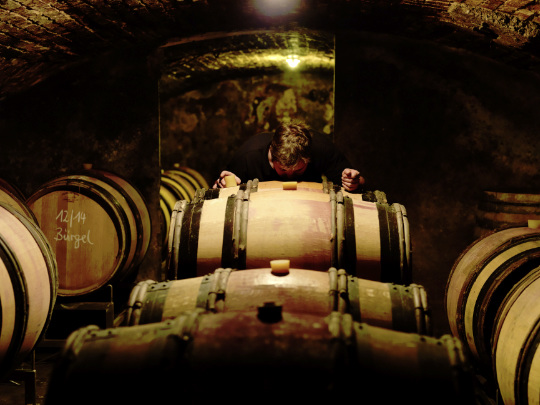
In the cellars Klaus-Peter has made a few changes as well from his father’s time, but the vast majority of the focus continues to be on the vineyard work. The white wines now (particularly the Rieslings) are fermented more in old oak fuder, rather than in stainless steel tanks than was the case for his father, and indigenous yeasts are relied upon whenever possible for the fermentations. The one relatively novel approach that Klaus-Peter has adopted for many of his white wines is to allow the grapes to macerate on their skins for thirty or forty hours prior to pressing them and running off the juice to fuder for fermentation. This is a bit of a risky maneuver that requires perfectly pristine fruit, and so selection in the vineyard and at the winery before the grapes go to the press is a fundamental tenet of the Keller philosophy. The basic bottlings of the white wines are fermented at slightly lower temperatures than the Grosses Gewächs, and they are bottled earlier as well. The riesling Grosses Gewächs and the G-Max bottling (Klaus-Peter’s top, old vine dry riesling cuvée) are allowed to rest on their fine lees until March after the harvest, prior to being prepared for bottling, which is done with a very light filtration. Additionally, some of the cuvées are also held back in bottle an additional six months prior to being released to allow the wines to fully harmonize.
Finding the balance of physiological (flavour and tannin) and sugar ripeness in the vineyard, without compromising freshness, has been the key to achieving greatness across the wine world.
In the Vineyard and Winery
Klaus-Peter now uses a small, old-fashioned basket press for almost all of his wines these days, as he feels it is so much superior to a pneumatic press that it is worth all of the additional time it takes pressing, so there are plenty of near-sleepless nights as the grapes come in, but the results in the last few years clearly speak for themselves!
2018 yielded highly concentrated wines, more so than usual. Keller continues to pick ever so slightly earlier than the norm to make finer wines.
2018 wines are made via multiple passes in the vines, firstly for acid vibrancy and later picks for a creaminess to the wine.
Any fruit from vines under 5 years old was not used for any Keller wines at all and was sold off.
The flic below is in German, it gives you a great feel for Keller’s Vineyards
Klaus-Peter Keller has once again made an absolutely brilliant range of 2018ers, and though this is no surprise, it was interesting to see how the lineup was shaped by the style of the vintage here. The 2018 lineup from Weingut Keller has its full array of dry wines this year, as the vintage characteristics were very good for making top flight dry wines (and no one in Germany these days does this better than Klaus-Peter Keller), but the surprise in 2018 is that there are no Prädikat wines above Kabinett this year. As Klaus-Peter commented about the Prädikat wines, ‘the conditions were absolutely perfect for making great, great Kabinetten, so this is what we focused on this year.’ Klaus-Peter and Julia Keller and their picking team generally made two passes through each vineyard this year for each separate cuvée for which they were selecting, with the first one designed to get “a bit more acidity and energy” into the blend and more structure, and the second pass a few days later to get just a touch more “creaminess to the fruit” component in every wine. It is a painstaking process, but the brilliant results here in 2018 are self-evident. As Klaus-Peter observed, “we did not use any fruit from vines that were five years of age or younger this year, choosing to sell these off, and we increased the average age of the vines used for all of our cuvées quite a bit in 2018 to make better wines this year.” John Gilman, View from the Cellar.
Where in the World are Keller’s Wines Made?
Keller’s home is in Flörsheim-Dalsheims lies on the rolling hills on the Rheinhessen-Rheinpfalz border, in the area of the Rheinhessen known as the Hügelland, centered around the towns of Flörsheim-Dalsheim and Westhofen. Here the soils are dramatically different from those that lie along the river, with many of the best lying on outcroppings of chalky marl, which recall the Trimbach family’s great Clos Ste. Hune more than they do the slate of the Mosel.
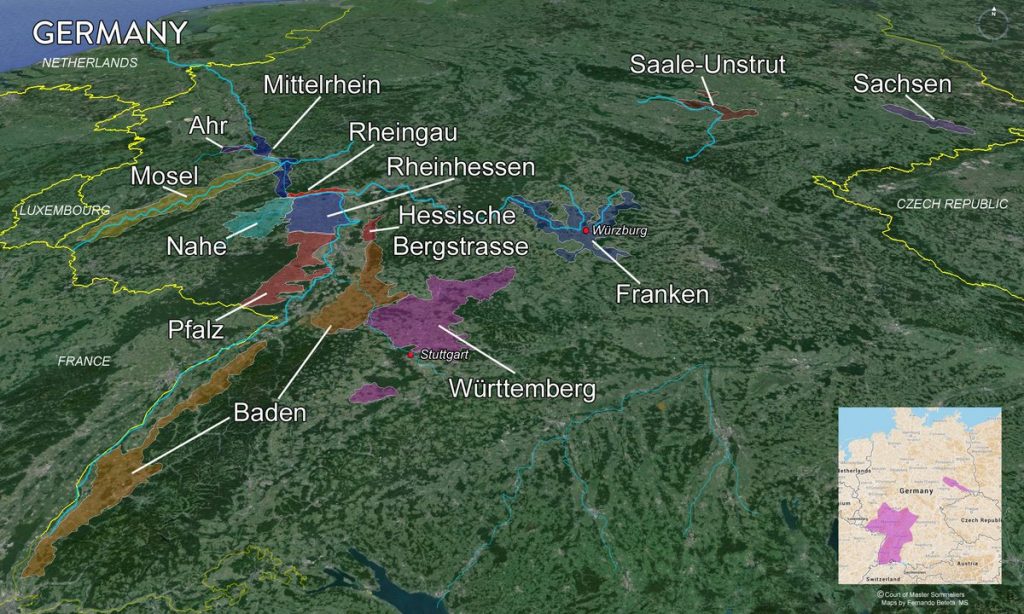
In this, southern part of the Rheinhessen, all of Keller’s GG vineyards rest within 10km of their home. This area of Germany is home to their great wine regions.
Vintage Notes from the Kellers
‘Whenever the Rhine runs low on water in the autumn due to low rainfall, the old vineyards have to work hard in the battle for nutrients and produce small-berry, complex, highly aromatic grapes, which are the prerequisite of a vintage with outstanding ageing potential. Only old and densely populated vineyards benefit from these conditions. Only where the roots are deeply anchored in the limestone or slate, it is possible even in such dry years as 2018 to transport exciting ingredients in the berries.’
‘….[from my experience] in Burgundy, the care and preservation of old and densely planted vineyards have become even more important to me… Quite simply, because we believe that such vines provide us with particularly high-quality grapes and lead to unique quality through their often root-deep roots.’
‘We can place 2018 in-line with 1911, 1959 and 2001, the three rainiest years in our region in the last century. These vintages ripened excellently and are among the greats! …The winter of 2017/2018 brought as much rain as in a long time. In the hill country we had more than 250 mm of precipitation, an important reserve that was later to benefit the vines. After the cold January and cool February and March, [temperatures] did not pick up until April, when the thermometer jumped. From the end of April, the constant summer temperatures accelerated sprouting and shoot growth of the vines, and already at the end of May the first vines began to bloom. Until then, the 2018 vintage was the exact opposite of the 2017 vintage. While it was dry in the winter of 2017 and humid in the summer, 2018 after a wet winter now seemed to be sunny and rainy.’
‘The very best wines of 2018 are simply stunning, and there are indeed hundreds and hundreds of these to be found dancing across the horizons of the three regions that I visited on my annual spring trip: the Nahe, Rheinhessen and the greater Mosel river valley. And in the tasting rooms and cellars where I settled down my tasting book and picked up my glass, the 2018 vintage was truly, truly brilliant!’ John Gilman, View from the Cellar
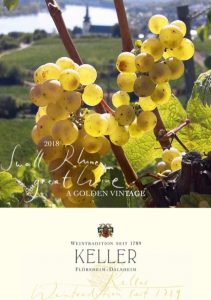
*All wines are in stock with the exception of the Von der Fels due in August.
About the Wines
Keller Silvaner Trocken 2018
Keller’s entry-level Grüner-Silvaner from old vines tastes as good as you would expect: delicate notes of hay, rich in extract, bone dry – a wine that encourages you to drink.
35-year-old vines from the Steingrube and Bürgel vineyards – so-called 'younger vines', at least compared with those for Feuervogel. Very pale. A shock to the system after the Spätburgunders. Has an intense grassy freshness, steely citrus. Juicy, scented on the palate, delicate and beautifully fresh. Only the merest hint of Silvaner’s earthy character – more of an almond-like quality that reminds me of some northern Italian whites. Zesty and full of citrus green-fruited energy. Persistent and mouth-watering. Precise, clean-cut but not simple.
Keller Silvaner 'Feuervogel' Trocken 2018
Back when the 2009 was set to be released German authorities refused to allow Keller to release this wine.
The authorities objected to the ‘Feuervogel’ arguing the wine was not typical for the region – and hence not worthy of being approved for sale.
The methodical Germans give each ‘quality wine’ a unique identification number, assigned by a regional inspection authority. ‘Quality wine’ (‘Qualitätswein’) is by far not the highest quality level of German wine, it is just one above the basic country wine.
If you want to designate your wine as Qualitätswein or above, you have to send it to a regional authority – who have no problem allowing rubbish wine onto the market (providing the wine passes a basic sensory/taste test), but if you don’t conform to what they consider to be typical for the region… This has led to a situation where some well respected German winemakers have given up on the system and label even their top range as basic wine.
Despite eventually been given the official seal of approval and an AP-Nummer (who did Kellers have to bribe, I wonder), the Keller wine neither prominently features vineyard nor quality designation, as would be usual for a German wine. instead it bears the name of a ballet by Igor Stravinsky: The Firebird.
Silvaner is Germany’s second signature white variety. A few particularly old Silvaner vines (about 70 years) live in Keller’s vineyards, and grapes from those went into the Feuervogel, a wine matured in the traditional, large wooden barrels.
Needless to say the wine lovers have won out and get to devour this beauty!
Comes from Steingrube and Bürgel vineyards, as does the Grüner Silvaner, but Feuervogel is always from the older vines – 50+ years. Smells riper and richer than the Grüner Silvaner, more pear and stone fruit than herbal. More spice, too. Creamy, inviting. Then on the palate, tension and intensity and a little more severe than I expected from the aroma yet still has creamy citrus. A wine that takes you on a journey of flavours and aromas in a short space of time.
Keller Riesling Trocken (Dry) 2018
From various vineyards, younger vines (10–15 years), including some from Kirchspiel. Equal parts limey fruit and stony minerality on the nose. That lime-juice purity on the palate, too. Edgy, bright, and remarkably intense for the first-level Riesling. Dry but has terrific fruit sweetness.
I cannot recall ever having a better, basic Riesling Trocken from Klaus-Peter, and I am sure the ramping up of the average age of vines for each bottling is the reason for this! The bouquet is flat out stunning, soaring from the glass in a complex blend of pink grapefruit, blood orange, chalky soil tones, wild yeasts, dried flowers and a topnote of orange peel. On the palate the wine is pure, fullish and again, really deep at the core, with great acidity and grip, superb focus and a very long, very classy and beautifully complex finish. This is not all that far off the quality level of the GGs fifteen years ago! It is a stunning value. 2019-2050.
The perfect way to get your eye in on the 2018 Vintage from the Rheinhessen. Kellers Trocken is a stunner, incredible length and depth of flavour. It dances lightly across your tongue. This is just a delight. The line of acid sits perfectly. At 12% alcohol it's quite a dry rendition, balance is bang on. The texture is just so fine. Perfume delights! Delicious lime, citrus cleanses.
Keller Riesling 'Limestone' 2018
Sourced from the younger plots of the prized ‘First Growth’ Abtserde & Kirschspiel vineyards which were deemed to be “just perfect” for drier wine at around 20-25g/L residual sugar compared to the Kabinett of the same name that runs at around 40g/L residual sugar. And as with the Limestone Kabinett, this is only made in exceptional years when the fruit is deemed worthy by Klaus Peter.
The Limestone Riesling QbA this year is essentially the same wine as the Riesling Trocken bottling, except this cuvée has one full gram higher acidity and finished its fermentation at twenty-one grams of sugar. The wine is superb, offering up a complex bouquet of pink grapefruit, passion fruit, pulverized limestone, apple blossoms and a delicate topnote of wild yeasts. On the palate the wine is pure, full-ish, complex and beautifully balanced, with a lovely core of fruit, fine focus and grip and lovely bounce on the long, succulent and flat out delicious finish. Just a lovely wine.
RS 25g/l. This comes as a breath of fresh lemony air after the intensity and spice of the Grosse Gewächse. This is still a touch spicy but has more lively and immediate fruit. Purest of lemon and grapefruit and a light stony minerality, a clear limestone effect – almost chalky on the nose. Juicy, crisp lemon on the palate. Off-dry but the acidity is so high you barely notice the residual sweetness. Lively, crisp and full of pure fruit. Long, nevertheless. Notable intensity.
Keller Riesling 'Limestone' Kabinett (Off Dry) 2018
Sourced from the younger plots of the prized ‘First Growth’ Abtserde & Kirschspiel vineyards which were deemed to be “just perfect” for Kabinett. And as with the Limestone, this is only made in exceptional years when the fruit is deemed worthy by Klaus Peter. Displaying all the hallmarks of a Keller classic, it walks the tightrope balancing sweetness and acidity with aplomb. White blossom, dried herbs, concentrated citrus, orchard fruits and a talcy minerality. Energy, power, drive and persistence.
The 2018 Limestone Riesling Kabinett was produced from selected parcels in the Kirchspiel and Abtserde vineyards this year. The wine is just beautiful, delivering a marvelous bouquet of tangerine, pink grapefruit, chalky minerality, citrus zest, apple blossoms and an esthery topnote of bee pollen. On the palate the wine is pure, delicate and medium-full, with lovely filigree and grip, great focus and balance, electric acids and a very, very long, complex and dancing finish. A glorious Kabinett!
RS 40 g/l. Fruit from AbstE & Kirchspiel. Pure, lifted lime and lemon fruit with piercing herbal freshness. Prettily scented with pure citrus on the palate. Doesn’t seem to taste much sweeter than the Limestone (non Kabinett) because of the fruit intensity. Finest of fruit, unencumbered by spice or herbs. Less complex than the Grosse Gewächse but with elegance and a dancing freshness. Unexpectedly persistent, even a little creamy on the finish despite the piercing acidity. Fruit from AbstE & Kirchspiel.
Keller Riesling 'Von der Fels' Trocken (Dry) 2018
Von der Fels,’from the rocks’, is made using GG “cru” vines from 10 to 30 years old. 15 of Keller’s 18 hectares are classed growths. A peek at Grosses Gewaches complexity for a ludicrous price.
About half of the production for this lovely bottling also hailed from the Kirchspiel vineyard, but from the chalky marl soils of the terres blanches section of the vineyard. The other half of the cuvée also comes from terres blanches soils, found in the lower sections of the other various grand cru vineyards: Hubacker, AbtsE and Morstein. One of the reasons that these lower slopes of these vineyards are not entitled to Grosses Gewächs status is that the soils here are deeper and richer, with more clay mixed in with the hard limestone. However, one would never realize this fact from the profile of the “Von der Fels” bottling, which is an intensely chalky, racy and minerally wine with a fine core of fruit and outstanding structural attributes. While much of the surging demand for Klaus-Peter’s wines focuses on the Grosses Gewächs bottlings of riesling, the outstanding quality of this regular bottlings of dry riesling demand that they not be ignored.
The 2018 von der Fels Riesling Trocken is magnificent this year and is probably the very finest bargain in the universe of dry Rieslings in all of Germany in this vintage! The wine offers up a beautifully pure and vibrant bouquet of pink grapefruit, tart orange, chalky minerality, dried flowers, citrus peel, a dollop of wild yeasts and a gently smoky topnote. On the palate the wine is deep, full-bodied, precise and impressive tensile for the vintage, with a great core, superb elegance and focus, outstanding backend mineral drive and a very long, very pure and complex finish. Great juice. 2023-2060+
Vines average age 30 years. As for all the Rieslings, some fermented in big old wood (1,200–2,400 litres), some in tank. A little deeper in colour than the Riesling trocken. Much richer and more complex on the nose, too. Spice and richness that I have not generally found in this wine – it shows the addition of some of the declassified Grosses Gewächs fruit. Those wild herbal notes of spontaneous fermentation but that does not detract from the mountain-fresh citrus of just-ripe Riesling. Has the complexity of the GGs but not quite the depth on the mid palate. As it opens, that spiciness turns into a more mineral quality, but complex minerality not the dusty stony quality of, say, young Chablis. There is also a greater richness in the mouth compared with the 2017 Von der Fels, perhaps a little more power and a little less finesse. Though Keller points out that some components finished fermenting just a few weeks ago and that this finesse will come. This vintage this wine seems closer to the GG rather than to the Riesling trocken, as it has seemed in the past. Impressive persistence. This should be a bargain this year.
Keller Riesling 'Von der Fels' Trocken (Dry) 2017
Zesty lime and seed-tinged apple on the nose anticipate the tart-edged, piquantly invigorating impression conveyed on a buoyant though otherwise polished palate. Suggestions of seedy green tomato and white currant add additional tangy stimulation. The long, strong finish is nearly mouth-shaking in its sense of animation, not to mention palpably chalk-suffused and consummately refreshing. I would not hesitate to cellar this as one would a top Grosses Gewächs. (Kirchspiel, Hubacker and Abtserde predominate in the blend, but due to the August hail, total volume is down by almost one-half from a normal harvest. There was so little of Keller’s less-expensive Gutsriesling that by the time I visited, he was unable to offer me a taste of it.)
Everything that is good in the 2017 Trocken is Amplified! A 'GG' in all but name!
Such a beautiful wine. Fine, chalky acid, is balanced by powerful fruit with elegance. A herbal, pithy hint, with citrus peel and florals leaps for the glass. The ridiculously low yields have created something of a phenomenon! Superb Riesling.
Keller Riesling 'ABTS-E' GG 2015
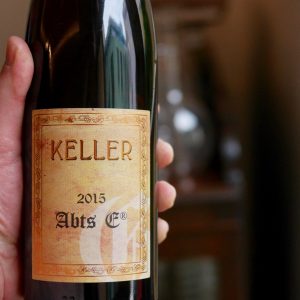
The favoured vineyard of the Bishop of Worms in the 14th century, today a sub-plot of the Brunnenhäuschen Grand Cru. The Kellers acquired their parcel in 1996 and own the oldest vines. Like Morstein, Abtserde ripens late, often in November. Very stony ground with little topsoil tends to produce sparse clusters of small berries. Beautiful minerality and finesse, dances over the palate.
The vines that Klaus-Peter has in the AbtsE are impressive, as they produce very tiny berries because of chlorosis (a vine disease that causes early yellowing of the leaves) which further slows photosynthesis during the hot summer, and translates into a very racy, minerally and discreetly complex wine. The first Keller vintage of the AbtsE, the 2006, is an outstanding wine by any measure, but I have little doubt that it will be surpassed in quality by subsequent vintages from this great vineyard.
A crisp bouquet of lemon zest, tangerine, grapefruit and wet stones is the prelude to a silky, weightless and incredibly intense wine of breathtaking complexity and completeness, which positively screams of its limestone origins. Drink 2020-2065
Absolutely stunning, the depth and length of this wine are insane. Beautifully developed, the texture of this wine is something special. Such an intrigue perfume, maximum harmony and poise.
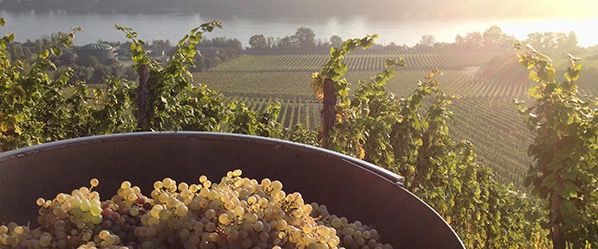






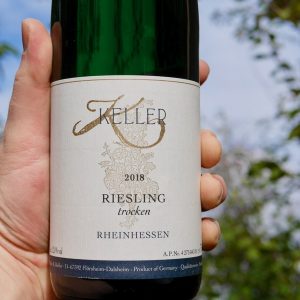
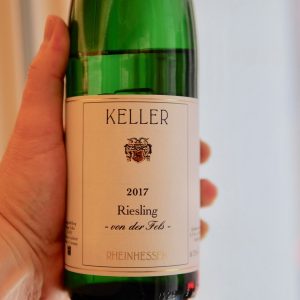
You must be logged in to post a comment.